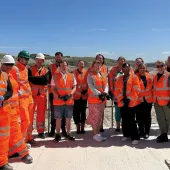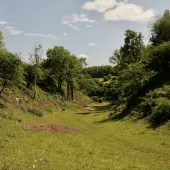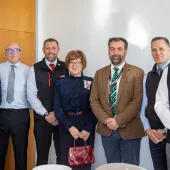Updated guide to safeguarding soil resources

Institute of Quarrying publishes ‘Good Practice Guide for Handling Soils in Mineral Workings’
AN update to the MAFF* guidance ‘Good Practice for Handling Soils’ is now available following a detailed review led by The Institute of Quarrying (IQ), in consultation with Natural England and the Welsh Government, and with the support and guidance of a steering group representing the minerals industry, mineral planning authorities, contractors, professional bodies and specialist consultants.
The updated publication, ‘Good Practice Guide for Handling Soils in Mineral Workings’, succeeds MAFF’s ‘Good Practice for Handling Soils’. The original guide was published in 2000 and designed specifically to help the mineral industry and its contractors to achieve a good standard of agricultural restoration when using various combinations of earthmoving machinery for soil stripping, storage, and replacement. The update is timely given the new government policies relating to land use and the safeguarding of all soils.
Aimed primarily at managers of quarry operations, mineral planners, restoration specialists, consultants and earthmoving contractors, the guidance and applications also extend to the civil engineering and wider construction sectors.
Julian Smallshaw, IQ’s head of education and standards, said: ‘The Institute has been able to bring together all facets of the industry to help peer review this valuable work. It has taken over three years to get to this point, and much time and effort by all involved. This resource will be a ‘must have’ for anyone involved in the handling of soils on mineral extraction sites.
‘To date the guidance has been widely used by the mineral industry and planning authorities, and their advisors. With the recent changes in land use (Natural Capital focus) and environmental-related policies (climate and soils), it is appropriate that the guidance is updated and expanded to include these.
‘At IQ, we will be incorporating this guidance in our own educational and training materials as part of our commitment to ensure learning is aligned with current best practices in the industry.’
Dr Neil Humphries, author of both the original and the updated guidance, said: ‘I am very pleased that the Institute has taken on this initiative and that it will become part of its educational programme. Importantly, it now integrates the role and contribution of professional soil scientists in the deployment of good operational practice by way of a Soil Resource & Management Plan.
‘This should be the primary reference material for characterizing the soil resources available, informing and successfully delivering the intended after-use(s), whether agricultural, horticultural, forestry, semi-natural vegetation /ecosystems, or other soil-based ones. It will underpin the operational design, land use and landscaping plan, the practices needed to be deployed, and the means of communication to all those involved. The importance of competency in the technical understanding of soils and the implications of the operational practices is also emphasized.’
The ‘Good Practice Guide for Handling Soils in Mineral Workings’ is available as a free PDF download from: www.quarrying.org/soils-guidance.
It is made up of two parts. Part One is an introduction to soils and their handling by machines, and Part Two comprises 15 practical application guidance notes (titled Sheet A – Sheet O). The total number of pages is 162 but these can be easily navigated through hyperlinks. The individual practical applications can also be downloaded as separate PDFs from the same location.
Now that the process of updating the guidance is complete, the steering group is keen for users of the guidance to provide ongoing feedback to inform future guidance. A feedback questionnaire is provided on the landing page where the documents can be accessed.
For more information or to download the updated guidance visit IQ’s website: www.quarrying.org/soils-guidance
*MAFF is the former Ministry of Agriculture, Fisheries and Food, now absorbed into Defra (Department for Environment, Food and Rural Affairs)









